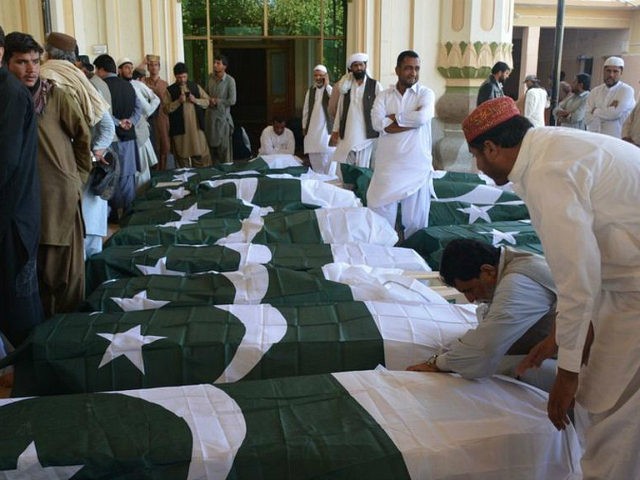An Islamic State (ISIS/ISIL) branch and a faction of an al-Qaeda-affiliated group, Lashkar-e-Jhangvi (LeJ), collaborated in carrying out an attack this week on a police academy in Pakistan that left 63 people dead and another estimated 120 wounded, according to an LeJ spokesman.
LeJ has also been associated with the Afghan Taliban, an ISIS rival and longtime al-Qaeda ally.
“We have no direct link with Daesh [ISIS], but we have done this attack together,” Ali bin Sufyan, a spokesman for Al-Alami, the LeJ faction, told Reuters.
“We will provide help to anyone who asks against Pakistani security forces, and we will also accept help for this,” he added, without elaborating further.
Nevertheless, Islamabad maintains that its regional rival India is responsible for the attack.
The ISIS wing in the Afghanistan-Pakistan region, known as the Khorasan province (IS-K/ISIL-KP), claimed responsibility for the attack before the LeJ spokesman said the two groups had worked together.
Although LeJ has been linked to ISIS rival al-Qaeda, IS-K has not denied those allegations.
“The Lashkar-e-Jhangvi is an anti-Shia terror group that has integrated with al Qaeda and the Taliban in Pakistan’s tribal areas,” reported the Long War Journal in February 2014. “The Lashkar-i-Jhangvi has an extensive network in Pakistan and its members often serve as al Qaeda’s muscle for terror attacks.”
“Analysts have long speculated that Islamic State would strike up a partnership with LeJ, even though the Pakistani group is affiliated with Islamic State’s rival, al Qaeda,” adds Reuters, noting that “the confirmation of a link between the two groups [IS-K and LeJ] will stoke fears that Islamic State, based in Syria and Iraq, is building a presence in Pakistan.”
Last Friday, Gen. John Nicholson, the top commander of U.S. and NATO troops in Afghanistan, told NBC News, that IS-K is “trying to establish their caliphate, the Khorasan caliphate, inside Afghanistan.”
Khorasan is a historic name for a region that covers Afghanistan, Pakistan, Iran, parts of India, and other surrounding countries. IS-K’s stronghold has been identified as eastern Afghanistan’s Nangarhar province, which sits right along the country’s border with Pakistan.
Recent armed clashes between nuclear-armed neighbors India and Pakistan in the disputed Himalayan region of Kashmir, to which both countries have competing claims, have exacerbated their historically strained relationship.
The attack on the police training college took place in Quetta, the provincial capital of Pakistan’s Balochistan province, which borders Iran and Afghanistan. Quetta has long been considered a stronghold of the Afghan Taliban. IS-K and the Taliban are competing for territory and influence in Afghanistan.
General Sher Afgun, a senior military commander in Balochistan, told reporters that intercepted calls suggested the terrorists had received orders from across the border in Afghanistan.
Afghanistan and Pakistan are constantly accusing one another of sheltering terrorists.
“Afghan officials have consistently denied sheltering anti-Pakistan militants, but the border is not fully under government control,” points out Reuters, adding, “The Quetta attack has also reignited a debate in Pakistan about the need for authorities to target all militant groups, not only those who are actively fighting against the state.”
Indian and Afghanistan officials have long accused Pakistan of harboring terrorists that operate on their soil. Islamabad denies the accusations.
“It may not be far off the mark to assume that militants in the country have assistance from across the borders. But this cannot change the fact that they essentially have roots within our own soil and that these have grown over the decades,” the News, an English-language Pakistani newspaper, said in an editorial.
Dawn, another English-language newspaper, said: “Blaming sanctuaries across the border or even foreign support is a political game when strong action is called for.”
The attack at the Pakistani police academy has been deemed the deadliest attack on security forces in Pakistan’s history.
Pakistan has reportedly dismissed IS-K’s claim of responsibility, claiming it has “crushed” IS-K’s attempts to expand in Pakistan.
Reuters quotes Anwar-ul-Haq Kakar, a spokesman for the Balochistan government, as saying that the IS-K claim of responsibility was “part of Indian design to malign Pakistan that this terror group has emerged in our soil.”
“We reject this baseless allegation completely,” responded a spokesman for India’s Foreign Ministry.
“Analysts have long speculated that Islamic State would strike up a partnership with LeJ, even though the Pakistani group is affiliated with Islamic State’s rival, al Qaeda,” notes Reuters.
LeJ is not officially listed as a foreign terrorist organization by the United States, but the U.S. State Department did designate the former leader of the group, who was killed in 2015, as a global terrorist. The al-Qaeda-linked group is considered a terrorist organization by Pakistan.

COMMENTS
Please let us know if you're having issues with commenting.